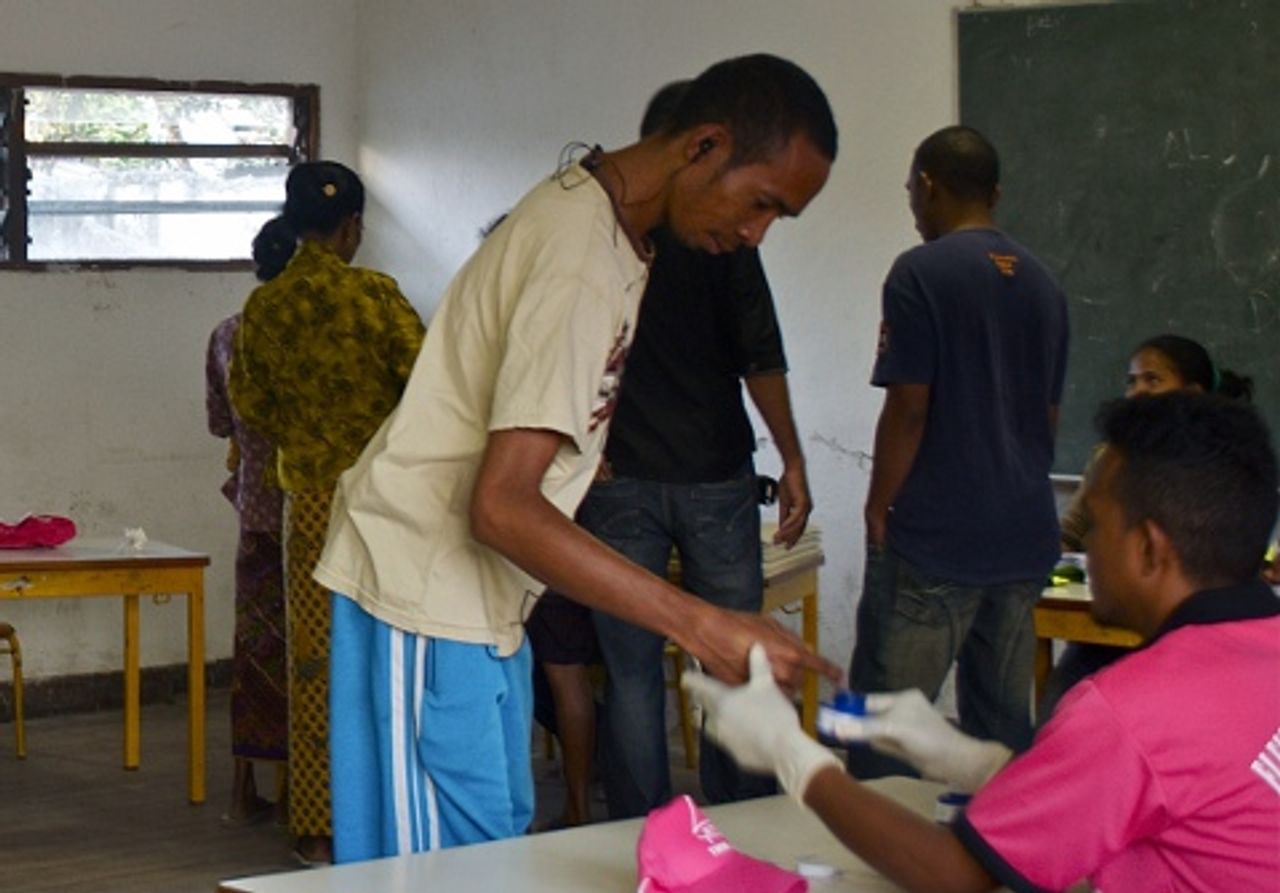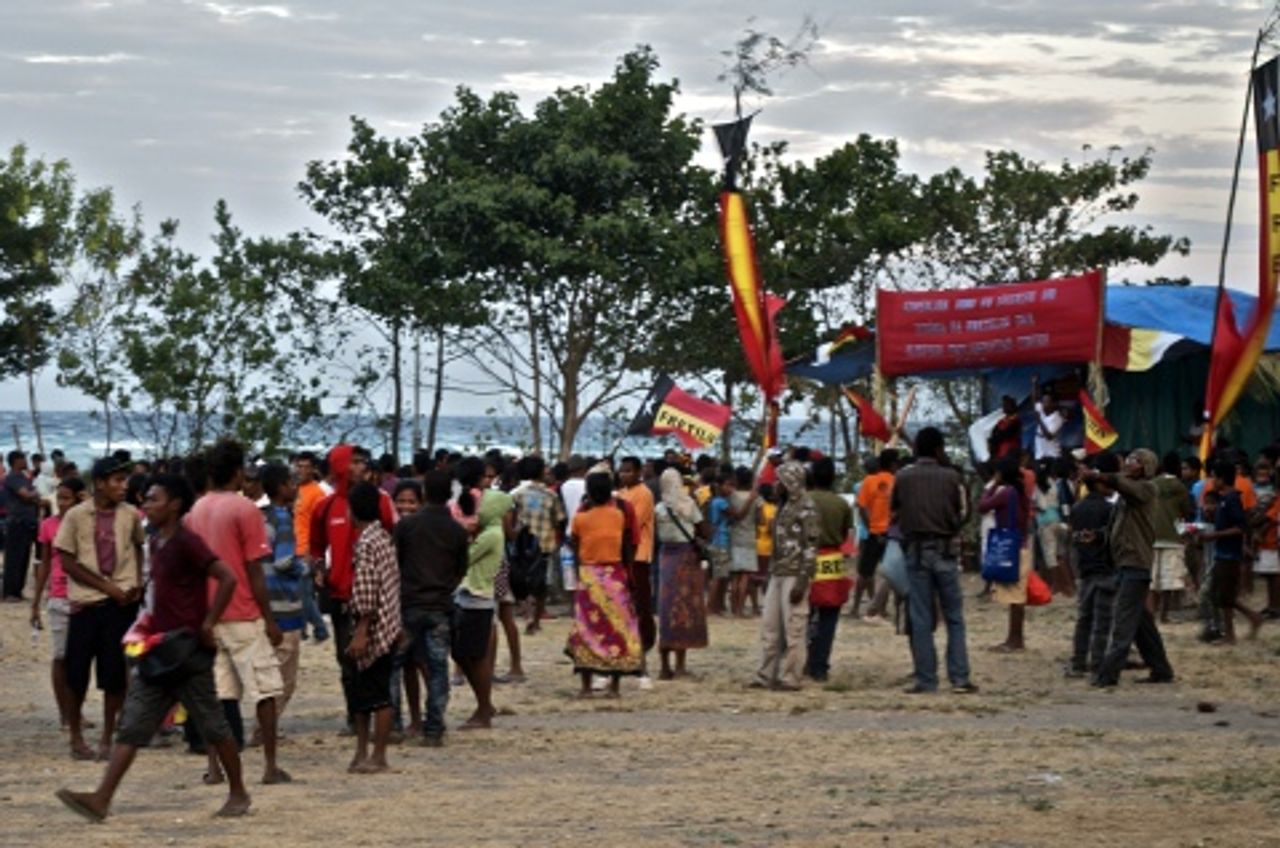East Timor’s third parliamentary election since formal independence in 2002 was held on July 7, again under the watch of thousands of UN police and hundreds of Australian troops. The ruling National Congress for Timorese Reconstruction (CNRT) nearly secured an absolute majority of parliamentary seats and plans to form a coalition government with two smaller parties, keeping the opposition Fretilin party out of power.
The CNRT secured the most votes in this year’s election, with 36.7 percent of the total, winning 30 seats in the 65 seat parliament. In the last election held in 2007, Prime Minister Xanana Gusmao’s party received just 24 percent of the vote and 18 seats in parliament. This year, Fretilin finished second with 29.9 percent of the vote and 25 seats. Only two other parties are represented in the new parliament. The Democratic Party (PD) won 10.3 percent of the vote and 8 seats, while Frenti-Mudança, a breakaway faction from Fretilin backed by Gusmao, won 3.1 percent and 2 seats.
 Inside a Dili polling station
Inside a Dili polling stationOverall voter turnout was 74.8 percent, down from 80.5 percent five years ago. A large proportion of the ballots cast on July 7 went to minor parties. More than 20 percent went to 17 other parties that failed to reach the 3 percent threshold needed to secure a seat. As a result, only four parties are represented in the new parliament, down from the nine in the previous one, potentially allowing Gusmao to form a more stable parliamentary majority.
The prime minister was installed in office in 2007, a year after an Australian military intervention and regime change operation against Fretilin Prime Minister Mari Alkatiri. The Fretilin leader was regarded by Canberra as too close to rival powers Portugal and China, and had incurred the Australian government’s wrath for resisting some of its predatory claims to lucrative oil and gas reserves in the Timor Sea.
Gusmao played a central role in instigating unrest and rioting in mid-2006, as part of an anti-Alkatiri drive by various right-wing forces, including the Catholic Church and Indonesian militia-linked organised crime groups. The subsequent elections in 2007 were conducted under a heavy Australian military presence, with the occupying troops staging provocations against Fretilin. Even when Fretilin won the most votes, it was denied its constitutionally recognised right to attempt to form a coalition government. Gusmao’s CNRT instead cobbled together an anti-Fretilin alliance.
The Australian government and military’s role in the 2012 elections has been more low-key than in 2006-2007. But officials have undoubtedly been working behind the scenes to ensure Fretilin stays out of office. The Australian-led military force and the UN mission in Timor are both scheduled to withdraw from the strategically important and resource-rich country by next year. It is vital for Australian imperialism to have trusted people in power during this transition.
In April, Taur Matan Ruak was elected the new president of East Timor, defeating Fretilin’s Lu-Olo Guterres. Now Fretilin has been kept on the opposition benches in the parliament. After the results were announced, Alkatiri declared that he was eager to form a national unity government with Gusmao, but this was quickly rebuffed.
 Fretilin campaign event, Dili waterfront
Fretilin campaign event, Dili waterfront On July 15, a CNRT party congress was broadcast live on both national TV and radio throughout the country. Delegates rejected Fretilin’s offer and voted to instead form government with the Democratic Party and Frenti-Mudança. Speakers, including well-known collaborators with Indonesian forces under its occupation before 1999, stridently denounced Fretilin.
The congress provoked violent protests in the capital Dili and in the eastern towns of Baucau and Viqueque. Several vehicles, including police cars, were set alight and young people clashed with police, who responded with tear gas and live gunfire. One Fretilin supporter, university student Armindo Soares Pereira, was shot dead in Hera, on Dili’s outskirts.
Despite the violence and repression, the US and Australia praised the elections, reflecting their satisfaction with the outcome. The US State Department declared the vote “a significant step forward in the consolidation of peace and security in Timor-Leste’s young democracy.” Australian Foreign Minister Bob Carr said the elections were “a strong step forward for this new democratic state.”
In reality, the election campaign was marked by widespread corruption by the CNRT. Since coming to office, Gusmao has stepped up government spending on infrastructure and other projects, developing a network of corporate patronage and cultivating a new wealthy business layer. Those awarded government contracts were expected to return the favour at election time, financing the CNRT’s campaigns. Gusmao also issued various cash handouts to targeted constituencies, including to anti-Indonesian resistance veterans and old age pensioners.
A Timorese expatriate who was in the country during the election campaign told the World Socialist Web Site: “People voted for CNRT because of money. The timing of the veterans’ handouts before the election was critical. We see these people lined up in the banks for days to receive their handouts, and around 80 percent of them were wearing CNRT t-shirts. I was also surprised to see the ability of CNRT to feed thousands of people during the election campaign. The party had a large number of 4-wheel drives and trucks used by members to mobilise the population during the election campaign... In Batugede, a town close to the Indonesian border, during the election campaigns they had a horse racing event and in some other districts motocross racing events. I am wondering in a poor country like East Timor where they got the money to do all of these things.”
Fretilin was unable to capitalise on the widespread hostility towards the CNRT-led government and the mounting frustration, especially among young people, over continued poverty and mass unemployment. Its vote was almost the same as in 2007; the CNRT boosted its vote not by winning Fretilin supporters, but by consolidating the anti-Fretilin vote that was previously spread across several parties.
Fretilin has condemned Gusmao for excessive public spending and for irresponsible management of the petroleum sovereign wealth fund that it established in 2002. Fretilin’s stagnant vote reflects popular hostility to a return to the fiscal policies of the Alkatiri government between 2002 and 2006, when public spending was heavily curtailed so that oil revenues could be funnelled into US treasury bonds, as advised by the World Bank and International Monetary Fund.
The election outcome again underscores the reality that none of the Timorese political parties represent the interests of the country’s working class and impoverished rural masses.
